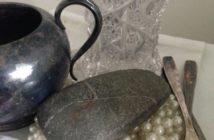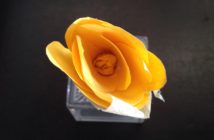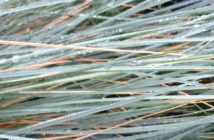Talented, hardworking and persistent creative Tauranga children’s author Debbie McCauley has done it again. This time it’s the bi-lingual version of Motiti Blue and the Oil Spill: A Story from the Rena Disaster – the story of the little blue penguin whose personal journey reminds us of the devastating consequences of the accidental wrecking of the ship “Rena” on the Astrolabe Reef.
Local artist Elliot Mason’s work “Little Blue Penguin” features in both matt and high-shine finishes on the front cover. It’s appropriate that Elliot’s work is featured – he was an immediate participant in the practical efforts to clean up the foreshore mess from the wreck. Debbie immediately tells me that she has had a great deal of support from other creatives, like Elliot, who have allowed her to use their images without charge. She also comments on the skill of her book designer, Sarah Elworthy, whose opinion “she really respects.”
The back cover pictorially details the little penguin’s transition from black, oily blob to clean and functioning water bird. Although the cover colours are predominantly of the sea and the sky, there is a black oily splodge to remind us what this is all about. It may be a children’s story but in essence it’s a clear and simple reminder of the speed at which an environment can be devastated.
The end papers (that’s the pages just inside the covers) have 365 penguin images – the number of little penguins collected, cleaned and safely returned to the wild. On every page whether it’s obvious or hiding as a shadow image – Motiti Blue is there as Debbie says “connecting all the information to the story.”
Each page has photographs, graphics and an information box – there’s the calendar of a penguin’s life; a maritime chart, facts about the Department of Conservation boat “Rewa”; the marine reserve; the ready response unit in a container; the Te Maunga Bird Hospital where the penguins stayed before release; what a microchip looks like (all the penguins were chipped before being released). An adult would be pleased to read this cleverly but simply presented wealth of information.
What also strikes me about the book is that there is no attempt to blame anyone for the disaster. But it is an outstanding reminder of the effects of the incident and the ongoing issues for Motiti Island and the wider environment.
The other thing which is outstanding is that this is the bi-lingual edition of Motiti Blue. The story of the book is in both English and Te Reo Maori (New Zealand has three official languages, Te Reo Maori, English and Deaf Sign Language). The translation is by Tamati Waaka. It’s so quietly natural to see both languages used together. As Debbie reads me the story of Motiti Blue, turning each page, I learn the Maori name for the Astrolabe Reef is Te Tau o Otaiti.
Debbie McCauley self publishes her works (an earlier work is “Taratoa and the Code of Conduct) with the assistance of talented specialists like Sarah Elworthy and the support of other creatives like Elliot Mason, Richard Moore and Paul Cumming who all supplied artwork and images. (Ironically Maritime New Zealand permitted the free use of their images and only one had to be paid for – Fairfax Media!).
Despite the overwhelming support for the project it’s clear talking with Debbie that getting a book like this to publication requires not only talent but hardwork and persistence. And Debbie appears to have that in buckets.
Until she was 12 years old the family lived in Whakatane. Debbie is one of four girls – the second.
She said her father wasn’t formally educated, he had to go to work at age 13, but the house had floor to ceiling books. With her sisters Debbie wrote books, numbered them and created envelopes for their “Library”. Debbie has a tertiary qualification – a BA. She did this over nine years while working part-time and parenting her children.
She says she’s worked at the Tauranga Library for 11 years. She applied for a student librarian position and initially worked Saturdays and Sundays in circulation moving to the information section of the Library on condition she completed her degree. She tells me “she likes to finish things.” Persistent!
I ask the obvious question – why do you write these stories “because they need writing and stories need to be available to children in a way they can understand.” And what would she do if she didn’t have to work – stupid question – she’d write.
[Note for our overseas readers. The saga of the wreck of Rena continues for the residents of Motiti Island and parts of the wider coastal North Island of New Zealand. There is currently an environmental planning application by a trust formed by the owners of the Rena to leave the remains of the wreck on the reef. Part of the cargo of the Rena was tiny plastic beads; these are apparently appearing on other Bay of Plenty beaches and beaches to the north.]
Rosemary Balu





